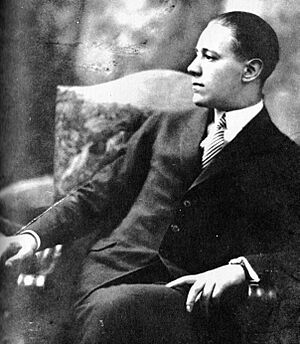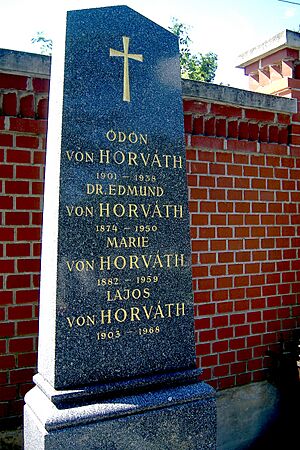Ödön von Horváth facts for kids
Quick facts for kids
Ödön von Horváth
|
|
|---|---|

Von Horváth in 1919
|
|
| Born |
Edmund Josef von Horváth
9 December 1901 Sušak, Rijeka, Austria-Hungary (now Croatia)
|
| Died | 1 June 1938 (aged 36) |
| Occupation | playwright and novelist |
| Signature | |
Ödön von Horváth (born Edmund Josef von Horváth, December 9, 1901 – June 1, 1938) was a famous writer from Austria-Hungary. He wrote plays and novels in German. He was known for his interesting stories that often talked about society and love. Some of his well-known plays include Italienische Nacht (1930) and Der Jüngste Tag (1937). He also wrote popular novels like Jugend ohne Gott (1938). He was a very respected writer before he died at a young age.
Contents
Early Life and Education
Ödön von Horváth was the oldest son of Edmund Josef Horváth, who was a diplomat from Austria-Hungary. His mother, Maria Lulu Hermine Horváth, came from a military family.
Ödön started elementary school in Budapest in 1908. Later, he went to a school called Rákóczianum, where he learned in the Hungarian language. In 1909, his father became a nobleman and moved to Munich for work. In 1913, Ödön went to secondary school in Pressburg (now Bratislava) and Vienna. There, he learned German as a second language. He finished secondary school and then joined his parents in Murnau am Staffelsee, in Upper Bavaria. From 1919, Horváth studied at the Ludwig Maximilians University in Munich.
Later Life and Death
Ödön von Horváth began writing in 1920 while he was still a student. In early 1922, he left university without finishing his degree and moved to Berlin. He later lived in Salzburg and Murnau am Staffelsee. In 1931, he won an important award called the Kleist Prize.
When the Nazi government came to power in Germany in 1933, Horváth moved to Vienna. In 1938, when Austria became part of Nazi Germany (this was called the Anschluss), Horváth moved again, this time to Paris.
Sadly, Ödön von Horváth died in June 1938 during a thunderstorm in Paris. He was hit by a falling tree branch on the Champs-Élysées.
He was first buried in the Saint-Ouen Cemetery in Paris. But in 1988, 50 years after his death, his body was moved to Vienna and reburied in the Heiligenstädter Friedhof.
Literary Themes
In his books and plays, Horváth often wrote about everyday life, politics, and history. He especially wanted to warn people about the dangers of Fascism, which was a very strict political movement growing in Europe at the time.
One of his most famous novels, Jugend ohne Gott (which means Youth Without God), tells the story of young people in Nazi Germany. It's seen through the eyes of a teacher who doesn't like the racist and military ideas that the Nazi propaganda is spreading among his students.
The English title of his novel Ein Kind unserer Zeit (A Child of Our Time) was later used by a composer named Michael Tippett for his music piece (an oratorio) during World War II.
Works
Plays
- Das Buch der Tänze, 1920
- Mord in der Mohrengasse, 1923
- Zur schönen Aussicht, 1926
- Revolte auf Côte 3018 (Revolt on Hill 3018), 1927; later rewritten as Die Bergbahn (The Mountain Railway), 1929
- Sladek der schwarze Reichswehrmann, 1929
- Rund um den Kongreß, 1929
- Italienische Nacht, 1930
- Geschichten aus dem Wiener Wald (Tales from the Vienna Woods), 1931 (won the Kleist Prize)
- Glaube, Liebe, Hoffnung, 1932
- Kasimir und Karoline, 1932
- Die Unbekannte aus der Seine, 1933
- Hin und Her, 1934
- Don Juan kommt aus dem Krieg, 1936
- Figaro läßt sich scheiden, 1936
- Pompeji. Komödie eines Erdbebens, 1937
- Ein Dorf ohne Männer, 1937
- Himmelwärts, 1937
- Der Jüngste Tag, 1937
Novels
- Sechsunddreißig Stunden, 1929
- Der ewige Spießer, 1930
- Jugend ohne Gott, 1938
- Ein Kind unserer Zeit, 1938
Other Prose
- Sportmärchen, 1924–1926
- Interview, 1932
- Gebrauchsanweisung, 1932
Quotes
- "Nothing conveys the feeling of infinity as much as stupidity does." (From Geschichten aus dem Wienerwald)
- "Actually what I'm really like is very different. I just so rarely find time for it." (From Zur schönen Aussicht)
- Ödön von Horváth once found a skeleton of a man in the Bavarian Alps with a backpack. Inside, he found a postcard that said "Having a wonderful time." When his friends asked what he did, Horváth said, "I posted it."
- He once said about his home country: "If you ask me what is my native country, I answer: I was born in Fiume, grew up in Belgrade, Budapest, Pressburg [Bratislava], Vienna and Munich, and I have a Hungarian passport, but I have no fatherland. I am a very typical mix of old Austria-Hungary: at once Magyar, Croatian, German and Czech; my country is Hungary; my mother tongue is German."
See also
 In Spanish: Ödön von Horváth para niños
In Spanish: Ödön von Horváth para niños


